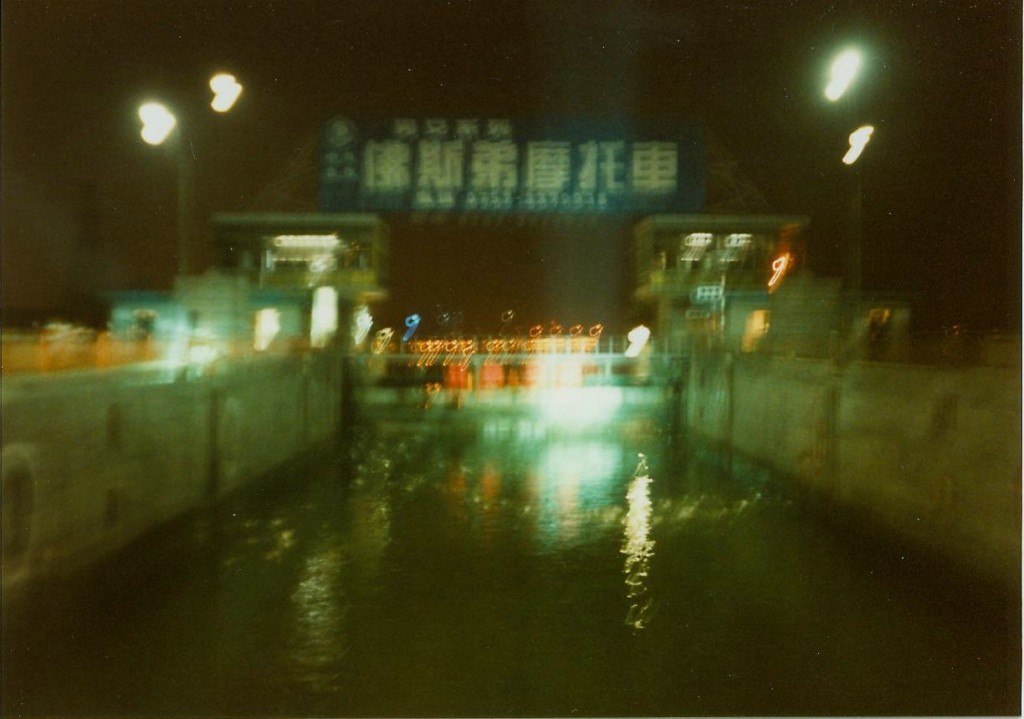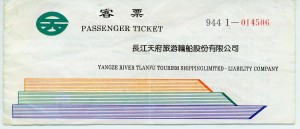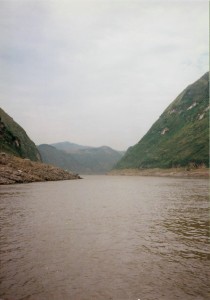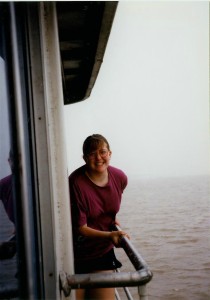This is a story about the time I ended up in a cabinet meeting with the Mayor of Wuhan. But before it gets there, I have to talk about diarrhea and vomit.
Diarrhea is a natural thing we don’t talk about much. Or when we do, we use euphemisms. Which is funny, really, because if there’s one thing we have in common with literally every other human being on the planet, it’s our excretory processes and their occasional complications.
In that spirit, I appeal to your likely empathy to put this story into context. Think of the worst stomach situation you’ve ever had. The one where anything you tried to eat was coming out of either end, more or less at random, but what it wasn’t doing was getting digested. So you were exhausted, hungry, and definitely not going to move further than three feet from the nearest bathroom, just in case.
I was once in such a place. Well, as far as “place” goes: I was in southern China, and I’d just gotten off a boat. And not the awesome kind that probably has a lovely bathroom. I had spent a week on a big, rusty tank of a boat, described optimistically to us as a luxury cruise ship. Okay, it was described to us that way pessimistically, by the charming travel agent who insisted “This is the luxury Chinese person cruise. The luxury American person cruise is much nicer –”
Obviously, we had wanted nothing to do with American-person cruises. Our wallets and our teenage hearts called out to the Chinese cruise. And that is how we ended up on that rusty tub of a boat — albeit in what we suspected was the very nicest cabin. And how we ended up spending a week having no clue what was going on. Like, what was being yelled over the loudspeakers, at whatever stupid o’clock of the morning made sense for reasons we didn’t know. Or what we were looking at on the day-trip up the Little Gorges, where earnest tour guides gestured vigorously at the walls of rock.
Or how we ended up abandoned at the little day-trip boat landing, able to see our ship down a huge hill and off a cliff, but with no idea where everyone had gone.
I’ll digress on that one. Be careful, the guide book warned. Cruise ships leave promptly at 3pm, and many tourists have been left behind. Meg’s watch said it was 2:45. And the boat was there and we were here, and worse yet, our luggage was there, and suddenly, awfully, I realized I had reached the absolute limits of my gastrointestinal fortitude.
“I’ll run for it,” said the amazing Meg. “You see if you can figure out where the buses went, and I’ll try to stop the boat from leaving.” We didn’t even have time to discuss the obvious futility of one single American woman running down a cliff in order to stop an entire cruise ship from leaving. I think deep down we both hoped that somebody, anybody, would notice the absence of the intriguing waiguoren and look for us. But neither of us was arrogant enough to consider that a sure thing. So off Meg ran toward the ship, while I hobbled — clenchingly, trying not to jolt my head or stomach, for fear of eruptions from either end — down the opposite hill in an absolute panic.
The path was almost-liquid mud, sloshing up my legs. In my head, our professor’s voice provided the perfect rhythm to my pitiful trot: “Never never touch standing water in China, gang. Not water or mud. You don’t even want to know the kinds of parasites you can get from that water.” Good thing I’m already dying here, I thought, adrenaline surging even further. There can’t possibly be a parasite able to make me more likely to poop myself in public. Also, I realized that I was so covered in mud it was likely nobody would notice either way.
At that exact moment I saw the ship’s tiny far-away crew fold up the gangplank. Even as cold horror flooded my limbs I realized it was too late: we were stranded without our luggage in the middle of nowhere in a country where we didn’t speak the language. Tiny biological enemies were penetrating my skin — probably seeping between my toes this very second. And if I moved one more step, just one more, I was going to dissolve into a puddle of biological material so disgusting that they’d go ahead and flood the Gorges early just to get rid of me.
And then! The cavalry arrived. From somewhere around a bend trundled a little bus packed full of people. The bus stopped (as you do, when you see a half-drowned muddy American flailing in the street) and opened its doors, and I scrambled aboard. I immediately spotted familiar faces from our cruise and knew we were going to be okay. Or at least I was going to be okay, I realized with horror. Because Meg had scrambled off down the hill towards what was obviously the wrong cruise ship, and I had no idea where she was, or how to explain my predicament.
Thank goodness language learning is so predictable, right? You always learn the same vocabulary first, and while rice and university and teacher weren’t terms I needed at that moment, I had a little I could work with. At what was probably an inappropriately loud volume, I wailed, “Wode pengyou zai nar?!”
The busload of passengers burst out laughing. I was too tired to experience a normal language-anxiety reaction and worry that I had insulted someone’s mother. In point of fact, it was probably plenty funny to see a mud-covered, lost American teen shrieking “WHERE IS MY FRIEND?” at top volume, even if she carried off the grammar and tones correctly. It’s sort of a big existential question for a bus slogging through Yangtze mud, when you think about it.
Fortunately, Meg was quickly found, and for the rest of the trip we were greeted with laughter every time we left our room, and people grabbing me, pointing to her, and saying “Pengyou! Friend, there!”
That would have been a compelling reason not to leave the room often if I’d been inclined to do so, but the excitement of the day seemed to make the party in my stomach that much more raucous. I stopped even caring what was drifting past outside the window. I just wanted to get somewhere on solid ground, and then I wanted someone to airlift my mother in from the United States so she could make me some soup and make it all go away.

Remember back when you used film, and film was expensive? And you used to only take one picture of things? And then you’d develop the film and it turned out you’d missed your ONE SHOT to get a nighttime photo of the great Yangtze dam while it was being built? Yeah.
Nothing much improved by the time we got to Wuhan. We disembarked just before sunset and told the driver of a taxi to take us to the nearest hotel that would take American credit cards. There are some things you know your father will pay for, even if they’re unexpected charges on his bill. After a night of mediocre air conditioning in the Sheraton, I staggered after Meg to the train station early the next morning, and held up the wall next to the ticket window while she tried to buy us tickets back to Beijing.
“No, not these tickets; these are second-class. We need sleeper tickets, please. Look, my friend is sick.”
The ticket agent, who spoke quite good English, shook his head. “I can’t sell you those tickets.”
“The sleeper car is totally full? Every single last bed? On every train today?”
“Nooo,” he hesitated. “I just… I can’t sell you the tickets.”
“So there are seats, we just can’t have them?”
“That is correct. I am very sorry.”
I allowed myself to fall into view, grasping the counter and leaning towards the glass. I don’t remember if I managed to say anything. I don’t think I probably needed to do so. I think Meg had only to point to me and raise her eyebrows, and suddenly we were in possession of two tickets for sleeper berths. Because when Death looks you in the eye, things get done, even if you can’t talk about why you couldn’t do the things to begin with.
And let me tell you, when we boarded that train, I wasted approximately zero seconds falling asleep. I think I was face down and out cold before Meg had finished stashing her luggage. And probably mine too, come to think of it, because my luggage did end up somehow in Beijing. I’m feeling like I might need to send Meg flowers, now, in 2015.
In general trains are nice places to sleep, when they’re going at constant speeds and the rhythm of the track can be a lullaby. But occasionally a sudden braking or a sharp curve can break that rhythm, and even someone who is dying of God-knows-what and sleeping the sleep of the near-dead will find herself jolted awake. It happens.
What happens less often is when you are jolted awake on a train and realize you’re not alone in your bed. In fact, you’re smooshed up against the back wall of the berth, and three men in suits are perched along the edge of the bed, uncomfortably and carefully, so as to respect your space. But still, on your bed, pretending you’re not there.
I sat up groggily, which prompted my three companions to leap up and move awkwardly to the sides of the compartment. Meg’s head swung down from the bunk above.
“Um…?” I asked.
“Yeah, I know, right?” She rolled her eyes. “It’s a little complicated — ”
She was interrupted by a half-cough from a tall, bulky man sitting on the bunk opposite mine. He did not stand, but extended his hand to shake mine. “I am the Mayor of Wuhan,” he said, in perfect English. “I had reserved this cabin, but I am delighted to share it with two lovely American students. And now, I apologize for my staff, but if you’ll give us just a minute, we’re almost finished with our cabinet meeting.”
The three gentlemen nodded and smiled vaguely at me as they sat back down, pinning me into the dark against the wall. Meg grinned at me and retreated into her space above. And I lay there, in the gloom of the under-bunk, listening to the Mayor of Wuhan being updated by his cabinet, as we sped northward to home.
As you do.




